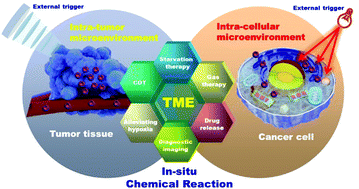Nanoparticle-triggered in situ catalytic chemical reactions for tumour-specific therapy
Abstract
Tumour chemotherapy employs highly cytotoxic chemodrugs, which kill both cancer and normal cells by cellular apoptosis or necrosis non-selectively. Catalysing/triggering the specific chemical reactions only inside tumour tissues can generate abundant and special chemicals and products locally to initiate a series of unique biological and pathologic effects, which may enable tumour-specific theranostic effects to combat cancer without bringing about significant side effects on normal tissues. Nevertheless, chemical reaction-initiated selective tumour therapy strongly depends on the advances in chemistry, materials science, nanotechnology and biomedicine. This emerging cross-disciplinary research area is substantially different from conventional cancer-theranostic modalities in clinics. In response to the fast developments in cancer theranostics based on intratumoural catalytic chemical reactions, this tutorial review summarizes the very-recent research progress in the design and synthesis of representative nanoplatforms with intriguing nanostructures, compositions, physiochemical properties and biological behaviours for versatile catalytic chemical reaction-enabled cancer treatments, mainly by either endogenous tumour microenvironment (TME) triggering or exogenous physical irradiation. These unique intratumoural chemical reactions can be used in tumour-starving therapy, chemodynamic therapy, gas therapy, alleviation of tumour hypoxia, TME-responsive diagnostic imaging and stimuli-responsive drug release, and even externally triggered versatile therapeutics. In particular, the challenges and future developments of such a novel type of cancer-theranostic modality are discussed in detail to understand the future developments and prospects in this research area as far as possible. It is highly expected that this kind of unique tumour-specific therapeutics by triggering specific in situ catalytic chemical reactions inside tumours would provide a novel but efficient methodology for benefiting personalized biomedicine in combating cancer.



 Please wait while we load your content...
Please wait while we load your content...